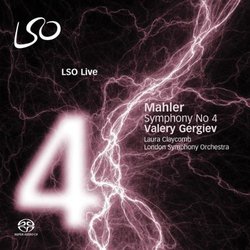A beautiful, moving Fourth -- one of the best things in Gerg
Santa Fe Listener | Santa Fe, NM USA | 03/09/2010
(5 out of 5 stars)
"It was brave of Gergiev to go where no Russian had gone before, recording a complete Mahler cycle in one season without the benefit of a home tradition. Except for Kondrashin's Mahler recordings from Moscow, I can think of only Kurt Sanderling in East Berlin and Vaclav Neumann in Prague among Soviet-bloc conductors who made any impression, and not a very memorable one. (I've never heard Svetlanov's cycle.) The very lack of tradition gives Gergiev's cycle many awkward moments, but also moments of freshness. He's always thinking, feeling, and inventing on his own. Some listeners find the results grating; I'd rate them as variable in their highs and lows.
This new Mahler Fourth begins on a low, with a dragging tempo, somber mood, and grinding bass line that is totally at odds with the spirit of the movement. However, six bars later Gergiev has righted himself, and suddenly the sun comes out, leading to a bold, forthright reading with dramatic conviction. For once the Wunderhorn world of this symphony isn't limited to a charming pastoral. Gergiev finds some bite and plenty of rustic clumsiness -- all to the good. The LSO follows along with some eager, at times bumptious playing. (I'm getting the impression more and more that Gergiev is really shaping them into his orchestra, a change that this most chameleon of orchestras might have resisted.)
The outsider feeling of this Fourth increases in the second movement. Where almost every other conductor tries to make the devil's fiddle more grotesque and the mood eerier, Gergiev is positively benign. In a phrase, he's more Viennese, in the vein of Bruno Walter's charm and geniality. But the phrasing is so nimble and the playing so elegant that one can't complain. the mistuning of the solo violin adds just a slightly acrid edge. The Adagio is the centerpiece of the symphony, and although apparently simple in its lyric flow, the great interpreters find urgency and pathos, which then justifies the apocalyptic closing section. Gergiev is a past master of quiet, slow music, and his skill is evident from the first bars -- he finds a tempo that sings and sighs at the same time. The LSO's string body has always been a marvel, and they follow with gorgeous effortlessness. The opening of Heaven's gates at the end is done with surprising reticence.
In the finale, Gergiev makes a strong contrast in the ambling pace of the opening and the faster music, which almost races. Texas-born lyric soprano Laura Claycomb is past forty but has a suitably young voice, which she uses more for childlike pathos than innocent joy. This is in keeping with Gergiev's own tendency to be humorless. Some may find the finale not charming enough, and no doubt the conductor forces his singer into some breathless rushing at times. But she copes well, and I'd say that the result is quite distinctive, a movement of mystery in place of the usual marzipan paradise.
In all, this is one of the most successful installments in Gergiev's cycle so far, along with Sym. 2, 6, and 7. We have the Fifth and Ninth to go before all the results are in, but it's clear already that back home he is pushing Russia to take Mahler into account after long decades of relative neglect."


 Track Listings (4) - Disc #1
Track Listings (4) - Disc #1